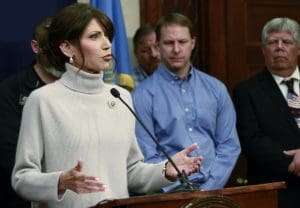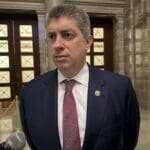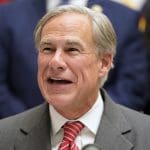Governors who pushed hardest for reopening get lowest approval
Governors who bragged about keeping their states open also received low marks.

A 50-state poll released Tuesday shows that most governors who refused to issue stay-at-home orders or rushed to reopen their states get among the lowest marks for their handling of the coronavirus.
The SurveyMonkey data shows that while 49 of the 50 governors get majority approval for their responses to the COVID-19 pandemic, the eight who got the least support included three governors who never issued stay-at-home orders, another who co-authored a Washington Post opinion piece bragging about keeping his state “open for business” during the pandemic, and three more who have come under fire for reopening too quickly.
Of the seven governors — all Republicans — who refused to issue stay-at-home orders at any point in the pandemic, most rate in the bottom half nationally as far as approval. They include Kim Reynolds of Iowa, Pete Ricketts of Nebraska, and Kristi Noem of South Dakota, and Mark Gordon of Wyoming. (Arkansas Gov. Asa Hutchinson and Utah Gov. Gary Herbert fared slightly better.)
Four of those governors — Gordon, Ricketts, Hutchinson, and Reynolds — boasted earlier this month that their states “stayed open in the covid-19 pandemic” and that their “approach worked.”
Not all of their constituents seem to agree. Reynolds and Ricketts, who both refused to issue stay-home orders, were in the bottom eight nationally when it comes to approval. Iowa and Nebraska also saw a higher number of infections, per capita, than most other states.
Four more governors who ranked among the lowest in approval have pushed to reopen their economies quickly.
Mike Parson of Missouri encouraged residents of his state to go out shopping and to concerts despite the pandemic.
Greg Abbott continued to reopen more businesses and schools in Texas this week, even after seeing the highest jump in new cases in his state since the start of the pandemic. He even admitted in a private call with state legislators earlier this month that “pretty much every scientific and medical report” predicted reopening would “lead to an increase in spreads.”
Ron DeSantis of Florida spent the first several weeks of the COVID-19 crisis stubbornly refusing to close the state’s beaches to spring breakers and pushed the false claim that the coronavirus does not affect young people. Though he eventually issued a stay-at-home order, he has been rapidly reopening the state even as cases continue to climb.
And Brian Kemp of Georgia, whose 43% approval for the crisis makes him the only governor without majority support, pushed to reopen so quickly that even Donald Trump — an evangelist for speedy reopening — chastised him last month. This week, he was forced to apologize after his administration released misleading data falsely showing coronavirus cases were significantly decreasing in Georgia.
The three top ratings in the survey went to Republican governors of “blue states” — Larry Hogan of Maryland, Phil Scott of Vermont, and Charlie Baker of Massachusetts — who were perceived as taking the crisis seriously and taking quick action to promote social distancing. All three received higher levels of approval from their Democratic constituents than from Republicans.
Notably, every governor except Georgia’s Brian Kemp received a higher percentage of support for their pandemic response than Donald Trump. Just 43% of Americans approve of Kemp’s handling of the crisis, according to a Washington Post-Ipsos poll last week.
Trump said in March that on this crisis the buck does not stop with him and has repeatedly said governors were responsible for testing and reopening.
This piece has been updated.
Published with permission of The American Independent Foundation.
Recommended

Missouri governor hopeful Bill Eigel rejects affordable childcare proposal
Eigel has previously supported stripping funds from public schools and once opposed an expansion of early kindergarten.
By Jesse Valentine - April 15, 2024
Montana Gov. Greg Gianforte hosts event with religious extremist
J.P. De Gance is the founder of Communio, an organization that uses social media marketing tools to push a far-right agenda.
By Jesse Valentine - March 27, 2024
Texas Gov. Greg Abbott floats building a wall on the Oklahoma border
It’s not the first time Abbott has engaged in Civil War adjacent rhetoric.
By Jesse Valentine - February 22, 2024






































































